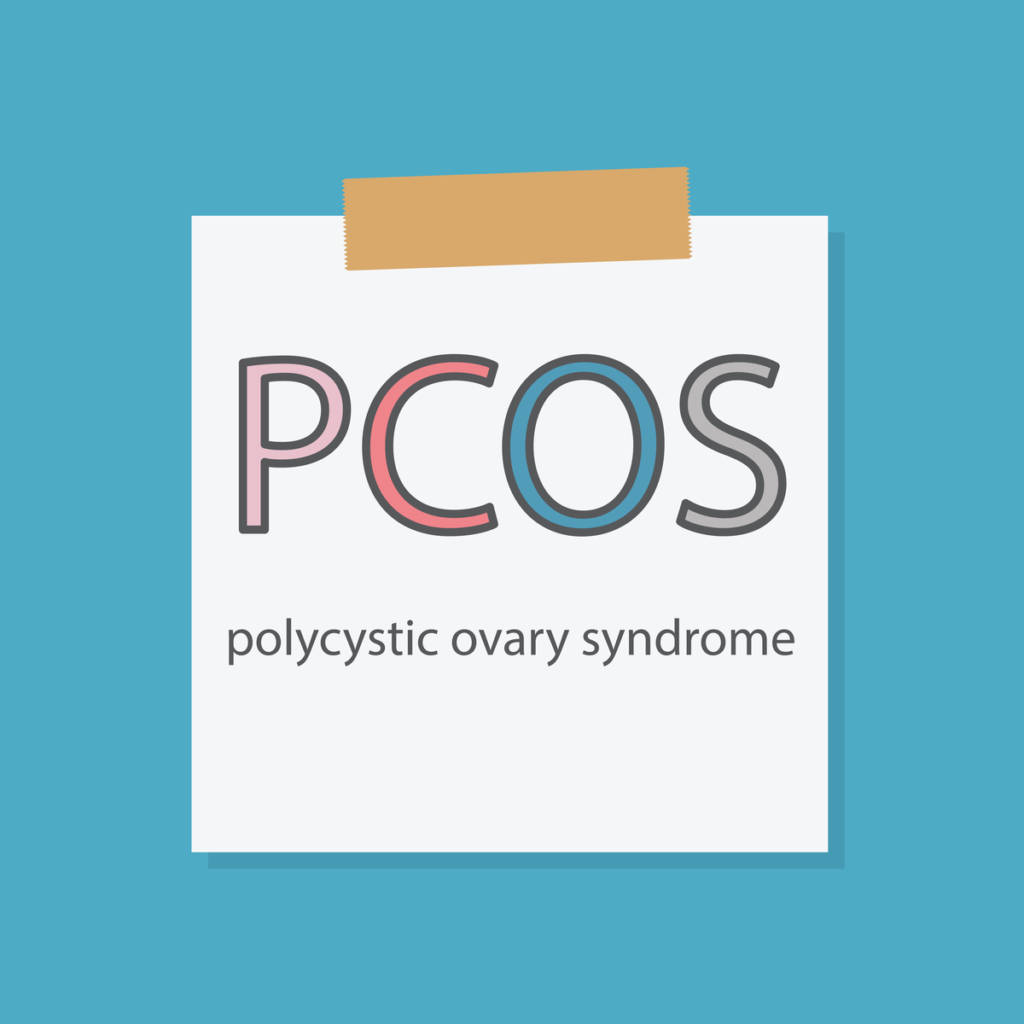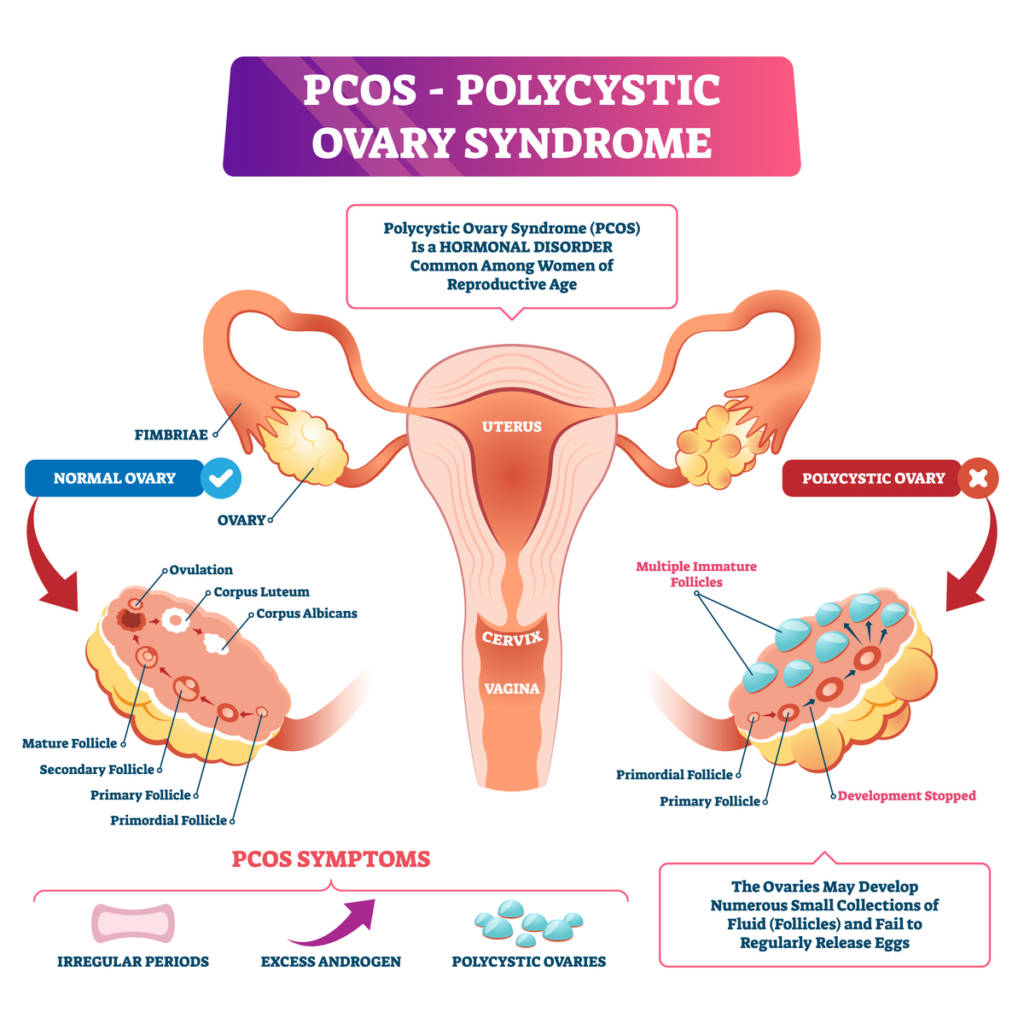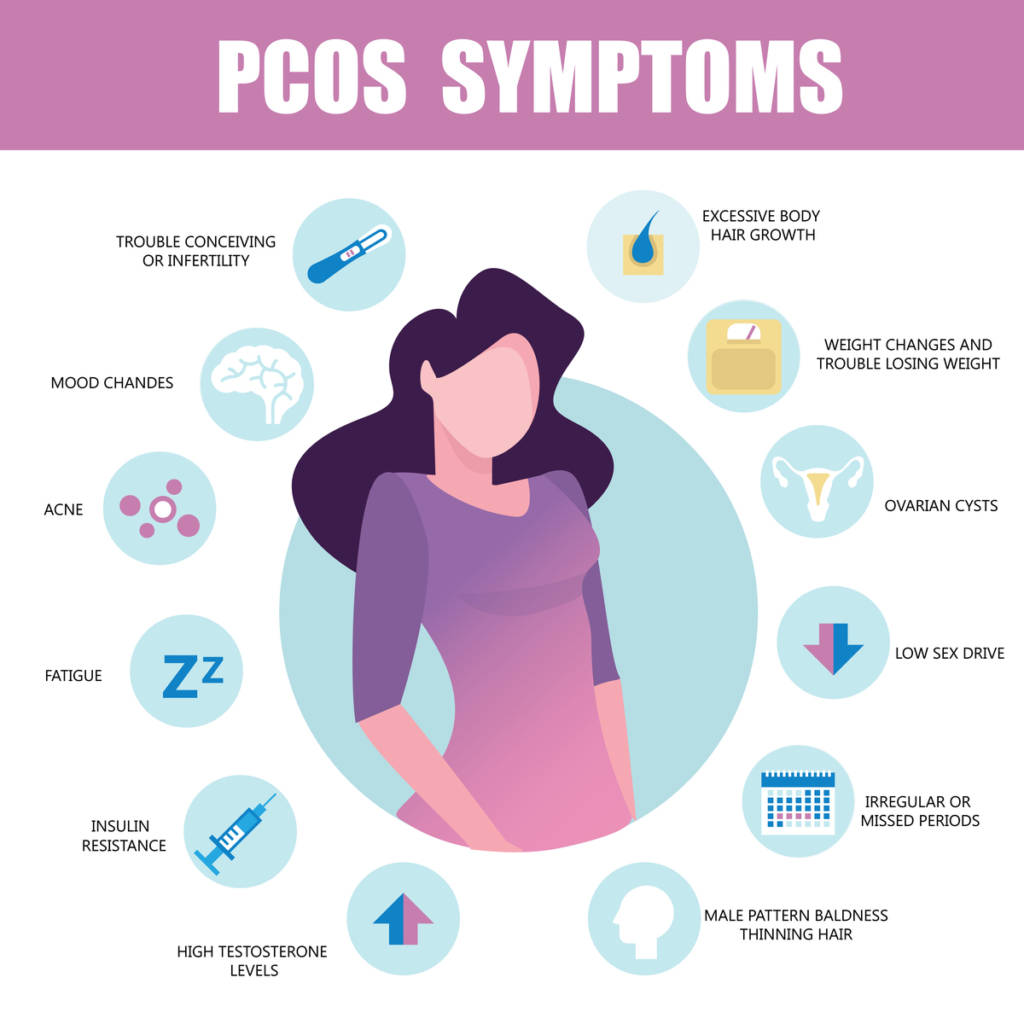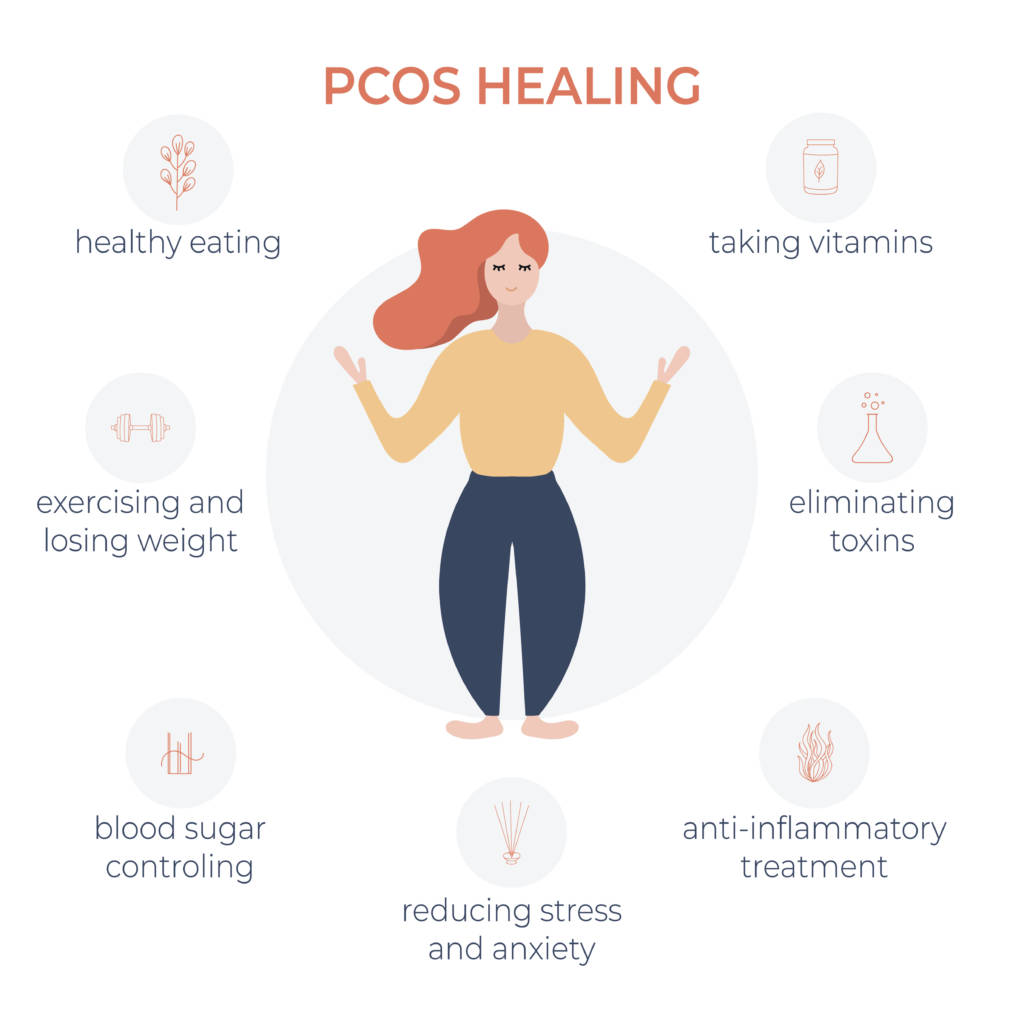Polycystic ovary syndrome (PCOS) is the most common hormonal health problem in women during reproductive years. It is a known cause of up to 30% of infertility in couples seeking treatment. It is commonly under diagnosed condition and may affect up to as many as 15% of females during this time.

The 3 main features of PCOS are:
- Irregular periods– which means your ovaries do not regularly release eggs (ovulation)
- Excess androgen – high levels of “male” hormones in your body, which may cause physical signs such as excess facial or body hair.
- Polycystic ovaries – your ovaries become enlarged and contain many fluid-filled sacs (follicles) that surround the eggs (but despite the name, you do not actually have cysts if you have PCOS)
If you have at least 2 of these features, you may be diagnosed with PCOS.
PCOS EXPLAINED
With PCOS the ovaries will contain a large number of harmless follicles that are up to 8mm (approximately 0.3in) in size. The follicles are underdeveloped sacs in which eggs develop. In PCOS, these sacs are often unable to release an egg, which means ovulation does not take place. It’s difficult to know exactly how many women have PCOS, but it’s thought to be very common, affecting about 1 in every 10 women in the UK. More than half of these women do not have any symptoms.

SIGNS & SYMPTOMS
Usually start during your late teens or early 20s.
They can include:
- Irregular periods or no periods
- Difficulty getting pregnant as a result of irregular ovulation or failure to ovulate
- Miscarriage
- Hirsutism hair growth– usually on the face, chest, back or buttocks
- Depression
- Weight gain
- Thinning hair and hair loss from the head
- Oily skin or acne
Although it is important to note that you don’t have to have had gained weight or have acne for example to be diagnosed with PCOS.

PCOS AND LONG TERM HEALTH
It is important to tray and address PCOS symptoms as they may impact your long-term health
Many body systems are affected in PCOS resulting in several health symptoms such as a risk of insulin resistance and thus an increased risk of metabolic syndrome, cardiovascular disease, non-alcoholic fatty liver disease and chronic low-grade inflammation. PCOS may also also be associated with an increased risk of developing health problems in later life, such as type 2 diabetes and high cholesterol levels.
CAUSES OF PCOS)?
The exact cause of PCOS is unknown, but it often runs in families. It’s related to abnormal hormone levels in the body, including high levels of insulin. Insulin is a hormone that controls sugar levels in the body. Insulin lowers your blood sugar by storing the glucose in cells. Many women with PCOS are resistant to the action of insulin in their body and produce higher levels of insulin to overcome this. High insulin levels can tell the ovaries to make more testosterone
This contributes to the increased production and activity of hormones like testosterone. Insulin is a fat-storage hormone that concentrates fat in your abdominal region. Being overweight or obese can also increases the amount of insulin your body produces so it is important if at risk especially to target this.
TREATING PCOS
If you have PCOS and you’re overweight, losing weight and eating a healthy balanced diet can make some symptoms better. There are also prescriptive medicines available to treat symptoms such as excessive hair growth, irregular periods and fertility problems.
If fertility medicines are not effective, a simple surgical procedure called laparoscopic ovarian drilling (LOD) may be recommended. This involves using heat or a laser to destroy the tissue in the ovaries that’s producing androgens, such as testosterone. The positive message is that with treatment, most women with PCOS are able to get pregnant.
NUTRITION AND PCOS
The good news is that diet and lifestyle changes can be of significant help to women affected by PCOS.
Effective natural treatment protocols commonly centre around the nutritional support of these four key areas:
- Weight Management
- Blood sugar balancing & insulin function normalisation
- Hormone balance
- Ovarian health support

Key dietary, lifestyle and supplement factors
This may seem a lot. I strongly recommend seeing a Nutritional therapist to discuss all you need. They can work with you to put together a healthy eating plan to support your lifestyle. Below are a few tips but this list is not exhaustive. A lot is common sense:
- Avoid refined, processed, convenience foods and sugary drinks and snacks
- Eat 3 distinct meals daily, choose organic wholefoods cooked from scratch. Avoid snacks between meals
- Eat within an 8-10 hour time-restricted window and finish your evening meal by 7pm. This is to facilitate a 14-16 hour overnight fast
- Reduce caffeine & alcohol
- Include good quality protein (poultry, meat, tofu, tempeh, beans, chickpeas, eggs)
and fat (nuts, seeds and their oils, oily fish, avocados, olives, grass-fed butter) with each meal - Have a daily portion of fermented foods such as kefir, kombucha, sauerkraut or kimchi
- Include liver supportive foods and drinks in your daily diet such as fresh parsley, artichoke, nettle tea and green tea
- Include a portion of cruciferous vegetables such as broccoli & cauliflower daily
- Add phytoestrogen-rich foods such as miso, tempeh, tofu & chickpeas into your diet
- Add freshly ground flaxseeds into your diet.
- Drink water
KEY LIFESTYLE FACTORS
- Pay close attention to your sleep hygiene to ensure you are regularly getting good quality sleep
- Audit your diet, lifestyle and environment to identify ways you can eliminate toxins wherever possible. Reducing overall toxic load is important for hormonal balance
- Regular exercise to support weight maintenance and a balanced stress response
- Build in extra time for relaxation and self-care into your daily routine
There are also a few key food supplements which have shown to be effective with PCOS such as B vitamins, magnesium and myo-inositol, to name a few. Please discuss with a health care professional such as a Nutritional Therapist.
Thank you for reading. As always if you make any changes to how you eat or decide to take food supplements it is advised to discuss with a trained health professional.
Regards
Fiona Waring
Dip Nut, BSc.(Hons), MSc PHN, ANutr
Nutritional Therapist
M: +44 07957 267 964
eatyourgreens@fionawaring.com
‘Registered with the Association for Nutrition – www.associationfornutrition.org
Protecting the public and promoting high standards in evidence-based science and professional practice of nutrition.’